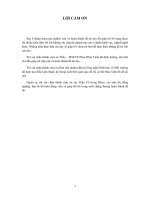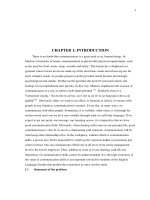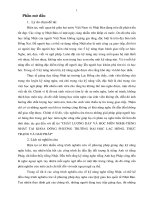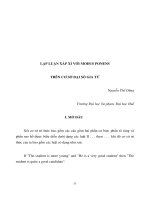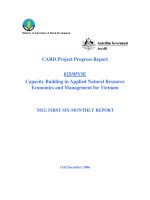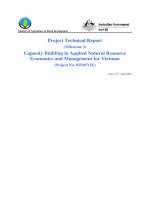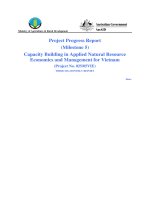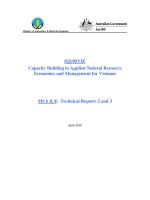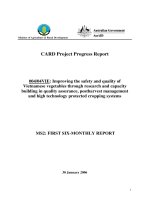Báo cáo nghiên cứu khoa học " CAPACITY BUILDING IN APPLIED NATURAL RESOURCE ECONOMICS AND MANAGEMNET FOR RURAL AREAS OF VIETNAM " pot
Bạn đang xem bản rút gọn của tài liệu. Xem và tải ngay bản đầy đủ của tài liệu tại đây (5.53 MB, 6 trang )
Collaboration for Agriculture and Rural Development
(CARD)
Program
124
CAPACITY BUILDING IN APPLIED NATURAL RESOURCE
ECONOMICS AND MANAGEMNET FOR
RURAL AREAS OF VIETNAM
Project
title:
Capacity Building in Applied Natural Resource Economics and Manag
ement
for Rural Areas of Vietnam
Project c
ode
:
CARD
025/05 VIE
Author
s
:
Dr
.
Pham Van Hung
1
,
Prof. Gordon MacAulay
2
Project implementing organizations
:
1
Faculty of Economics and Rural Development, Hanoi University of Agricultur
e (HUA)
2
University of Sydney, Australia
1.
Introduction
Vietnam is one of nations, which is
experiencing a rapid growth with market
oriented economy development. However, the
rapid economic growth has also resulted in
enormous pressure on na
tion’s natural
resources. Because of market imperfections and
failures, especially with respect to various
natural resources, there is a problem due to
resource overuses. This leads to arising
economic inefficiencies, and social and
environmental problems.
According to the world’s experiences, scientists
has showed that knowledge (understanding) on
economics and natural resource management
has been a crucial factor for sustainable and a
long
-
term development of economies. In all
management and research leve
ls, including
staff, researcher and extension workers, the
level of knowledge, understanding and using of
the principles of natural resource economics
(NRE) and management is limited.
The project CARD/ 025/05 VIE (Capacity
Building in Applied Natural Reso
urce
Economics and Management for Rural Areas of
Vietnam) has been designed to improve
understanding and strengthen teaching and
research capacity in natural resource economics
and management field for the two leading
universities in agriculture training
field in
Vietnam (Hanoi University of Agriculture and
Can Tho University). The project also establish
relationship among universities; extension
system and encourage to transfer of knowledge
from the University teaching and research staff
to extension staf
f and farmers.
The project links to the CARD strategic
objective which focuses on increasing rural
productivity and increasing agricultural
efficiency and competitiveness. The project
also links to strategic objectives for reducing
vulnerability to enviro
nmental and economic
shocks and the intermediate objective for
increasing stability of household incomes
through encouraging diversification of
production and marketing.
2.
Research contents and methods
2
.1
The components of the project
In order to assess
the level of resource use and
to prepare suitable documents for each
management level, the project focuses on need
assessment which relates to natural resource
use of farm households in 3 regions: North
,
Central
and South.
The CARD program focuses on teac
hing
and training. This project also organizes
series of trainings for lecturers; research on
natural resource economics and
management (trainings and send scholars
to University of Sydney);
o
Course 1: Organizing two
trainings for lecturers and research
sta
ff of Universities, research
institutes at Hanoi University of
Agriculture.
CARD 025/05 VIE
–
Applied natural resource
management
125
o
Course 2: Organizing two
trainings for lecturers and research
staff of Universities, research
institutes at Can Tho University.
o
Sending 4 scholars (2 from Hanoi
University of Agri
culture, 1 from
Hue University and 1 from Can
Tho University) to study in
University of Sydney.
Organizing training workshops for
extension staff from central to provincial
and district levels in the North and in the
South of Vietnam;
Conducting pilot work
shops for farmers,
farm managers, agricultural co
-
operatives
managers and local agricultural extension
staff at 3 regions: North, Central and
South;
Consulting to build curriculum for
undergraduate subjects such as natural
resource economics, environmental
economics and fishery economics for
Hanoi University of Agriculture; Can Tho
University.
Building websites for reporting project
activities and delivering knowledge on
natural economics and resource
management.
2.2
Approaches
The proposed project is desig
ned to strengthen
the capacity building in natural resource
economics in Vietnam in a layered framework.
In the first layer, and after considerable
consultation, the University of Sydney staff
will provide research, teaching and policy
analysis training to
Vietnamese academics,
policy analysts and extension specialists at a
national level. This training will be in the
context of the problems and issues identified in
the farmer surveys. In the second layer, those
trained in the first layer will train the ext
ension
specialists and policy analysts at a provincial
level. The training will be designed to impact
the advice and information provided to farmers
on the use of natural resources. This will be
demonstrated through a series of district level
workshops. In
the third layer, extension
workshops for farmers will be conducted, with
a focus on economically efficient natural
resource management.
Communication/Outreach Approach
The main
approach to communication/outreach is
through extension workshops that will b
e
conducted in the Mekong Delta at Can Tho
University, the Central Coast through Hue
University and in the north of Vietnam at
Hanoi Agricultural University. These
workshops will address the strategic questions
of strengthened and broadened capacity for
ec
onomics training of extension personnel in
Vietnam. Once this capacity is built it will
provide a continuing human resource base
which can be sustained into the future.
2.3
Implementation Methods
2.3.1
R&D Methodology
The approach used in the proposed pr
oject is
through research into specific resource use
issues designed to allow development of
training modules for use on knowledge transfer
and knowledge base building. These modules
will help to increase communication efficiency
and knowledge delivery as
well as
understanding of leaders and farmers about
natural resource management. In addition,
knowledge from trainings will facilitate
information updating and curriculum
development in universities.
Under the project, there are various small scale
studies
in the field of fishery; water and land
use and forestry. These studies are carried by
scholars and supervised by professors from
University of Sydney
2.2.2
Participatory Methods
On
-
going consultations with the major
stakeholders will be conducted in order
to, in
the first place determine the nature of the
training and extension activities, and
subsequently to obtain feedback and readdress
some key issues. This will assist in developing
the priority areas for training.
2.2.3
Methods to Address Capacity Ga
ps
The project has direct and indirect objectives
aiming at target beneficiaries including
lecturers; researchers; and policy makers from
universities and research institutes; agricultural
extension staff and agricultural staff at
Pham Van Hung
&
Gordon MacAulay
126
provincial and district l
evel; farmers and farm
managers.
The gap in knowledge on natural resource
economics and management is well defined
and filled in.
2.3 Dissemination Strategies
The project itself is built around disseminating
training outcomes to smallholder farmers and
na
tural resource users in Vietnam. The
ultimate role in the dissemination of the
outcomes to small
-
scale farmers will be played
by the Vietnamese extension personnel that
will be trained under the project. This role will
be enhanced through initial farm lev
el pilot
workshops conducted within the scope of this
project. These workshops will be designed to
ensure the flow from economic theory and
applied economics (improved capacity of the
academics, policy makers and extension staff)
to natural resource manage
ment on the farm
(delivered to the small holder farmers).
3.
Results and discussions
3.1
Training, workshop
The central feature of the project has been a
series of workshops in which 296 people
actively participated. The process was to
provide trainin
g in resource management to a
group of academics who then provided the
training for the extension workshops and then
the extension specialists provided training for a
series of Pilot farmer workshops (3
workshops).
The list of completed workshops is prov
ided so
as to reflect the extent of the key activities over
the life of the project.
Training Workshop, Hanoi (12
-
16 July,
2006) with 26 participants
Training Workshop, Can Tho, (17
-
21
July, 2006) with 19 participants
Extension Workshop, Hanoi (22
-
26
Janu
ary, 2007) with 25 participants
Extension Workshop, Can Tho (29
January to 2 February, 2007) with 26
participants
Extension Workshop, Hanoi (16
-
20 July,
2007) with 26 participants
Extension Workshop, Soc Trang (23
-
27
July, 2007) with 20 participants
Pilot
Farmer Workshop, Van Giang (16
-
17 January, 2008) with 30 participants
Pilot Farmer Workshop, Soc Trang (23
-
24
January, 2008) with 30 participants
Pilot Farmer Workshop Vinh, Hung
Nguyen, (14
-
15 July 2008) with 33
participants
Pilot Farmer Workshop Van Gia
ng, Hung
Yen (18
-
19 July 2008) with 30
participants
Pilot Farmer Workshop Soc Trang (21
-
22
July 2008) with 31 participants
Roundtable on Resource Management
Issues in Vietnam (17 July 2008) with 31
attendees
In addition, 4 research scholars visited the
U
niversity of Sydney for approximately 3
months each and each produced a significant
research paper in the field of natural resource
economics and management.
The outcome of the training workshop has
been highly appreciated by participants. In
particular:
3.1.1
Competency Assessment of Academic
Staff
Competency assessment requires that a
standard is set against which to test the level of
skills of a person or persons in relation to what
is ex
pected. This is clearly best done by
observation of what people do rather than what
they say. For the purposes of this project a set
of questions were asked before and after the
training and then for a smaller group a
significant period after the trainin
g in a Post
Training Survey. This can only be a very
limited assessment and therefore can only be
indicative of the outcomes from the program.
The level of knowledge and the capacity of the
academics involved in the training were clearly
lifted as reflect
ed in the pre and post workshop
knowledge tests. The average score for a set of
knowledge questions about issues relating to
natural resources before the Training
Workshops was an average score of 43.1 per
cent correct answers in Hanoi and 53.8 per
cent in
Can Tho. These percentages rose to
71.7 per cent in Hanoi and 65.6 per cent in Can
CARD 025/05 VIE
–
Applied natural resource
management
127
Tho after the training. These are average
numbers and clearly an improved
understanding was gained in relation to some
issues and not so for others. The more
technical ar
eas were less well understood but
for some of the basic ideas such as an
externality and discounting and compounding
there was significant change.
Results from the Post Training Survey who
that all the respondents who attended the
Training Workshops said
they had changed
their thinking about resource management,
they incorporated materials into their
educational materials, changed their methods
of teaching and had developed new materials
relating to resource management. This implies
a significant shift i
n the capacity and
perspectives of this group of academics and
this is likely to continue to grow and develop.
3.1.2
Competency Assessment of Trained
Extension Staff
The success of t
he workshop evaluations for
the Extension and Pilot workshops
demonstrated the capacity of university and
extension staff to provide excellent quality
training as a result of the training they were
given along with their existing capacities and
skills. I
n the case of the set of Extension
Workshops in July 2007 the average score on a
set of questions related to natural resource
issues was 42.9 in Hanoi and 45 per cent in
Soc Trang. These scores increased to 58.2 and
65 per cent after the training. The re
sults from
the Post Training Survey also reflect use of the
materials provided in the Extension
Workshops. Clearly, new skills and ideas have
been gained which allow material from the
training to be used in extension activities. Of
the 25 respondents 22
(88 per cent) said they
had incorporated material from the training
into their extension work and 20 (80 per cent)
had changed their methods of training as a
result. A total of 15 (60 per cent) had
developed new materials relating to resource
management a
nd 15 (not a matching 15
people) had changed the materials they
provided to farmers. These results do not
measure the extent of the changes but reflect
the use of ideas and materials and imply an
expanding set of skills obtained in the training.
On a more
subjective level there was also
significant capacity development for some of
the presenters at the Extension Workshops
who had not previously used PowerPoint. All
presenters very successfully utilized this
medium. Both University of Sydney staff and
sen
ior staff of both Hanoi University of
Agriculture and Can Tho University provided
support and a level of mentoring for the
academic and extension staff during their
presentations. A total of 28 different people
presented one of more presentations over the
set of workshops (excluding University of
Sydney staff). This included both university
trainers and extension trainers.
3.2
Curriculum Change
A detailed discussion was provided in the
Project Technical Report No
1 (Milestone 3) of
the draft curriculum proposal for an
Environmental and Resource Economics
course in the Faculty of Economics and Rural
Development at Hanoi University of
Agriculture and the course Environmental
Economics in the School of Economics and
Business Administration at Can Tho
University. The content of training workshops
on natural resource economics and
management has been utilized by lecturers of
the two universities and combine in their
teaching lessons for both undergraduate and
post gradu
ate level.
3.3
Website Documentation and Use
The Resman (short for Resource Management)
website is located in and maintained by Hanoi
University of Agriculture. The site contains
most of the PowerPoin
t presentations made at
all the workshops, the discussion papers,
policy briefs and decision
-
making tools.
Additional training materials have also been
added to the site and there is opportunity for
comments and discussions. Over 20,000 hits
have been ma
de to the website.
Collaboration for Agriculture and Rural Development
(CARD)
Program
128
3.4
Smallholder Benefits
Smallholder benefits from the project are
expected to flow directly from the reported
workshops as a result of providing training
directly to farmers, albeit a re
latively small
number.
Although, only 3 workshops were organized
for farmers at three regions, they have been
promoting awareness of a large group of
farmers on environmental problem in the
intensive production environment which is
simply done by the shar
ing of experiences that
was undertaken. However, over the longer
term the benefits of having provided training to
a group of academics and also extension
workers has provided some of the necessary
background support for the work at the farmer
level. Also
, as a result of the pilot workshops
there is now a small number of people who
have prepared teaching material and actively
participated in presentation of training to
farmers on significant resource management
issues under general guidance. Overall, while
the smallholder benefits from this project are
expected to take some time (3
-
5 years) to start
being apparent, a number of the necessary
steps have been undertaken towards the
delivery of a set of smallholder benefits
targeted to the better management of
agricultural resources.
3.5
Capacity Building
The broad focus of the project is on capacity
building at the academic, extension and farm
levels. As noted above there were 28 people
involved in providing training
sessions to
participants as well as the three academics
from the University of Sydney. This involved
a total of 160 sessions of which Vietnamese
presenters presented 76 sessions and most had
attended the training or extension workshops.
For the five Pilo
t farmer workshops the
development of extension specialists in giving
presentations in workshops in the area of
resource management has been significant.
Nine specialists all presented well
-
prepared
presentations for significant periods of time.
They wer
e assisted by their own colleagues
and also by the academic staff at Hanoi
University of Agriculture and also Can Tho.
This represents a significant development in
teaching capacity in the area of natural
resource economics.
In addition to development of
a teaching
capacity there was development of research
capacity as well. Four research scholars spent
about three months each at the University of
Sydney and learned skills in relation to the
development of research papers in natural
resource economics.
CARD 025/05 VIE
–
Applied natural resource
management
129
4
.
Conclusions and recommendation
s
The challenges to the environment in Vietnam
are very large indeed. Particularly is this the
case with water pollution and the degradation
of its quality. Many farmers are aware of the
problems but unclear as to how to
reduce them.
Thus, it is essential that more training is
provided in the area of natural resource
management and that this has a high impact.
The three
-
tier process used in the project
seemed to work well and provided a sense of
linkage from academic pro
gram to farmer level.
The training of leading extension personnel at
university level in natural resource management
seems also to be important as relatively few of
the extension specialists seemed to have
detailed knowledge in this area. However,
gainin
g significant impact at the farmer level is
likely to need farmer
-
level training but also
demonstration and ‘hands
-
on’ experience.
To evaluate impacts of trainings provided by
the project is very challenging due to the highly
variable learning styles, the
personal nature of
learning and the fact that it is a labour intensive
process. It is also important that the numbers of
participants in group
-
learning environments are
not too large or again impact is lost. These
factors have been managed in the project
as
well as possible with the use of groups that are
not over 25 for the Training and Extension
workshops and not over 35 for the Pilot farmer
workshops.
It also became apparent over the life of the
project that there has been significant growth in
the res
earch and teaching resources going into
environmental and natural resource use areas.
Encouragement was given by the project
activities to this investment. This is an
encouraging sign in that there will eventually
be significant progress in alleviating
some of
the worst resource use inefficiencies and effects
of pollution and waste. However, it also clear
that the institutions and organizations in
Vietnam will have to find their own way
through the web of resource and environmental
issues, not the least
of which, is the
development of their own methods and
approaches to teaching and research designed to
resolve the issues they face.
References
1.
Project No. 025/05VIE, “Capacity
Building in Applied Natural Resource
Economics and Management for
Vietnam”. F
inal report 6 (Milestone 11).
CARD Program. Available online:
www.resman.edu.vn.
2.
Project No. 025/05VIE, “Capacity
Building in Applied Natural Resource
Economics and Management for
Vietnam”. Report 5.5 for Milestone 10
(Reporting for Milestone 10 and
Revis
ions to Milestone 11). CARD
Program. Available online:
www.resman.edu.vn.
3.
Project No. 025/05VIE, “Capacity
Building in Applied Natural Resource
Economics and Management for
Vietnam”. Report 5 (Milestone 9).
CARD Program. Available online:
www.resman.edu.v
n.
4.
Project No. 025/05VIE, “Capacity
Building in Applied Natural Resource
Economics and Management for
Vietnam”. Technical Reports 2 and 3
(Milestones 6 and 8). CARD Program.
Available online: www.resman.edu.vn.
5.
Project No. 025/05VIE, “Capacity
Building in
Applied Natural Resource
Economics and Management for
Vietnam”. Progress Report (Milestone 7).
CARD Program. Available online:
www.resman.edu.vn.
